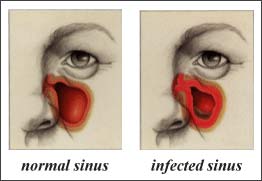Antibiotics are prescribed too often for sinusitis
According to the results of a study, US doctors still prescribe too many antibiotics for sinus infections, but even the lead doctor does not know how to stop them. This situation.
Dr Donald A. Leopold, head of the Department of Otolaryngology at the University of Nebraska Medical Center, says that because of the treatment of sinus diseases, antibiotics are the best of all. usable.
He said: 'Doctors currently do not have good drugs to treat chronic sinusitis. The only other drug being debated is topical steroid, but this drug is not good either. On behalf of the group of doctors, I think we feel frustrated because there are no better drugs to treat this chronic inflammation. '

Normal sinuses (left) and infected sinuses (Photo: Entnet.org)
Dr. Leopold said that another factor is the patient's demand.'Many patients call and ask for special antibiotics. They know the names of these antibiotics because they have been marketed to them, so they know that these drugs are on the market, and they really help reduce their disease somewhat. '
His group posted their findings on the ear-laryngology, head and neck surgery, March issue.
According to the report, the results of two national studies show that between 1999 and 2002, more than 17 million Americans visited health care facilities because Sinus sinus infection. Doctors prescribe at least one antibiotic to about 73% of acute sinusitis and about 70% of chronic sinusitis, persistent runny nose with persistent symptoms lasting more than 12 weeks .
The problem is that antibiotics only work against bacteria. However, many cases of nasal sinus infection are caused by other causes such as viral infections, allergies or hormonal changes. It is common practice to repeat antibiotics over and over again to avoid antibiotics in such cases to reduce the occurrence of dangerous drug-resistant strains.
Leopold admits that it is difficult to follow this principle when it is necessary to help patients with sinus pain, relieve symptoms immediately. He said: "Because of the lack of effective drugs, 'both patients and doctors are disappointed and it is an unhappy situation."
Dr. Kao said: There are many ways to determine if the sinus infection is caused by bacteria. The first is endoscopy: insert the tube into the nose and take a sample of sinus mucus. Another way is to spread the nasal smear: check for smear samples taken from the nasal membrane. The third way is X-rays.
Dr Kao said: 'The problem here is that these methods are expensive and time consuming. There is little difference between the symptoms of sinus infections caused by allergies, infections, viral infections and common colds. For us, or even specialists, it's hard to point out the cause of the disease when visiting someone with symptoms of acute nose disease. And the truth is that most people who are diagnosed with sinusitis visit their primary health care provider. '
Dr. Kao said: People are increasingly aware of antibiotic resistance, but most people who have cough, runny nose, lack of sleep, and other symptoms of sinusitis visit their doctor and Ask the doctor for antibiotics.
And so doctors often have the practical choice of giving people what they want to make them less sick than considering an unrealistic problem of antibiotic resistance.
Linh Anh
- Detection of the virus that causes sinusitis
- Why don't you need antibiotics when you have sinusitis?
- Causes of sinusitis
- Common misunderstandings of people with sinusitis
- Understand disease to use antibiotics correctly
- Natural therapy dealing with sinusitis
- The danger of sinusitis
- Useless antibiotics with most cases of bronchitis
- Be wary of gatifloxacin antibiotics
- Most sore throats do not need antibiotics
- G8 discusses how to fight doctors
- Sinusitis and things to know
 Green tea cleans teeth better than mouthwash?
Green tea cleans teeth better than mouthwash? Death kiss: This is why you should not let anyone kiss your baby's lips
Death kiss: This is why you should not let anyone kiss your baby's lips What is salmonellosis?
What is salmonellosis? Caution should be exercised when using aloe vera through eating and drinking
Caution should be exercised when using aloe vera through eating and drinking